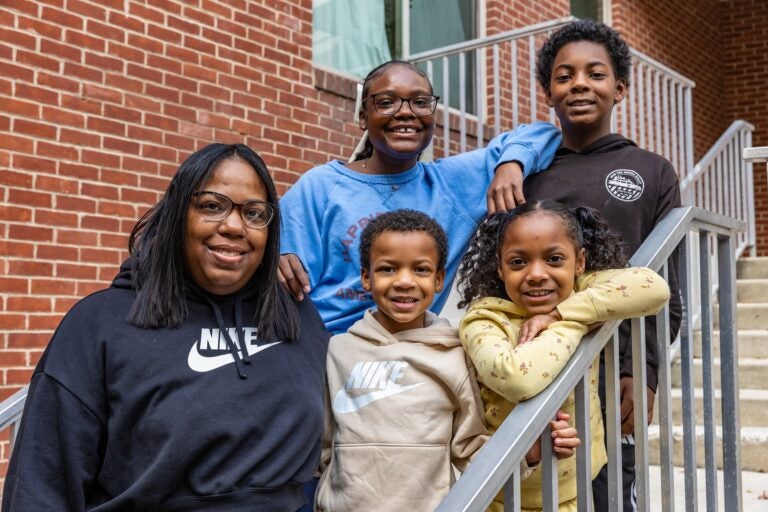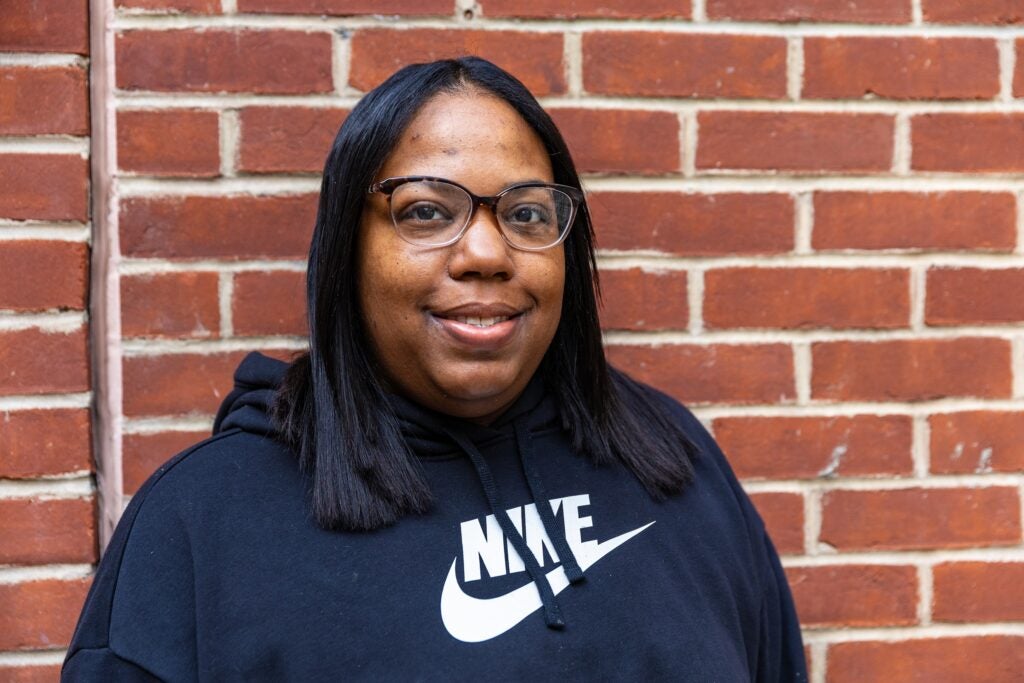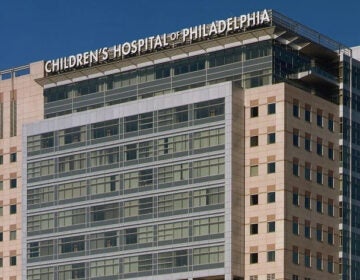A CHOP program showed promising results for families facing food insecurity. Researchers hope more funding broadens its reach
The Children’s Hospital of Philadelphia found nearly one in five patient families struggle to get enough food, and wanted to address it.
Listen 1:18
Sophia Wallace, 37, stands in her apartment complex's courtyard with four of her five children: Milan, 13, Mateo, 10, Masai, 8, and Kamau, 6. (Emily Cohen for WHYY)
From Philly and the Pa. suburbs to South Jersey and Delaware, what would you like WHYY News to cover? Let us know!
The Children’s Hospital of Philadelphia recently took its goal of keeping children healthy one step further with a pilot program that delivered groceries and meals to patients and their families who struggle with food insecurity.
In the United States, more than 10% of families with children struggle to get enough food, according to 2022 statistics from the U.S. Department of Agriculture. CHOP found that among the families of their patients, around one in five struggle with food insecurity, according to a 2019 survey.
This, of course, impacts patients’ health, said Dr. Aditi Vasan, a pediatrician and researcher at CHOP.
“When we think about the scope of factors that affect a child and a family’s health, we know that very few of them are things that happen inside the walls of a hospital or clinic, and much more of it has to do with the environments that they go home to,” she said.
So in July 2023, the hospital tested a program where, if a patient stayed at their hospital to be treated, and struggles with food access, their family could, upon discharge, choose to receive a week’s worth of prepared meals, six months of produce, or both.
“This program felt like a really meaningful way to be able to continue to support families with their needs, even after they left our direct care in the hospital,” Vasan said.
This isn’t new for the hospital. If families say they struggle with food, hospital staff already direct them to resources like food vouchers or help them sign up with community and government programs. A few years ago, CHOP set up an on-site food pharmacy where a family could get food, including fresh produce. The new program took the additional step of bringing food to the patients’ homes.
Sophia Wallace, a mother of five, said it helped when her 6-year-old son Kamau left the hospital a year ago after being treated for asthma.
Wallace works as a rideshare driver and gets government benefits to support her family, but said it’s not enough.
“It doesn’t always … cover the cost for the whole entire month, especially because I do have growing children who are always hungry,” she said. “The food program really did help me because I didn’t have to stress about running out of food, because I knew that food was coming.”

Wallace said her children liked the meals because they could pick from a menu of options. After the program ended, she kept the food containers and menu ideas to get into the habit of planning meals in advance.
@runherecomessophie @InflightCuisine #mealprep #fresh #gultenfree #lowsodium #lowsugar #cleaneating #familymeals #foodservice #fooddeliveryservice #childrenshospitalofphiladelphia #chop #asthmaawareness #asthma ♬ original sound - Sophie’sReality
Vasan and other researchers at the hospital found that the families who participated liked the program. The researchers recently published their findings in the journal Pediatrics.
They started this pilot with a corporate grant, and are now looking to internal and external grants, as well as government programs to keep it going in the long run, said Abbe Stern, CHOP’s food pharmacy manager.
This is something other hospitals are also thinking about, said pediatrician and researcher Dr. Zoe Bouchelle, who was part of the research but is now at Denver Health.
“There’s a lot that we can do from a hospital level, a clinic level, a health care system level, to try to meet families where they are and do our best to address the food insecurity that we know they’re experiencing,” she said, pointing to statistics that show many children’s hospitals screen their patients to see if they struggle to get enough food.
“This type of work needs to be multi-pronged, multi-level, and happening across hospitals, communities, states, [and] the nation, because it’s unacceptable for kids not to be able to have access to the food they need, to grow and learn and live their lives and become healthy adults,” Bouchelle said.
The CHOP program is a good idea, said Dr. Laurie Banach, a pediatrician at Children’s National Hospital in Washington, D.C. She was not part of this research but has previously studied food insecurity among hospitalized children. Her hospital, like others around the country, also started a food pharmacy program two years ago.
“What’s really great … about what the authors of this recent study did is they really took it one step further and are actually delivering food to the families because that kind of helps eliminate one additional barrier,” she said. “It also helps eliminate a lot of the stigma as well … a lot of people might not want to sign up if they have to go to a public place to get the food.”
Banach said doctors who treat children can see firsthand how access to food can impact their health, which motivates them to get involved.
“Obviously, it’s not … a typical function of a hospital to be in the business of distributing food. It just sometimes is a necessary function of a hospital,” she said.

Get daily updates from WHYY News!
WHYY is your source for fact-based, in-depth journalism and information. As a nonprofit organization, we rely on financial support from readers like you. Please give today.






